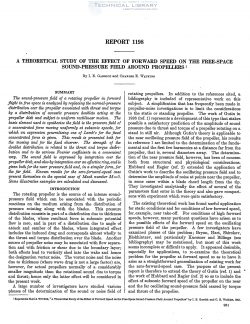naca-report-1198
- Version
- 128 Downloads
- 1.63 MB File Size
- 1 File Count
- November 2, 2016 Create Date
- November 2, 2016 Last Updated
National Advisory Committee for Aeronautics, Report - A Theoretical Study of the Effect of Forward Speed on the Free Space Sound Pressure Field Around Propellers

The sound-pressure field of a rotating propeller in forward
flight in free space is analyzed by replacing the normal-pressure
distribution over the propeller associated with thrust and torque
by a distribution of acoustic pressure doublets acting at the
propeller disk and subject to uniform rectilinear motion. The
basic element used to synthesize the field is the pressure field of
a concentrated force moving uniformly at subsonic speeds, for
which an expression generalizing one of Lamb’s for the fixed
concentrated force is given. This result is presented both for
the moving and for the fixed observer. The strength of the
doublet distribution is related to the thrust and torque distri-
bution and to its various Fourier coefficients in a convenient
way. The sound field is expressed by integration over the
propeller disk, and also by integration over an efiective ring, andis
given both for the near pressure fidd and, in a simpler form, for
the far field. Known results for the zero-forward-speed case
present themselves in the special case of Mach number M=0.
Some illustrative examples are calculated and discussed.
The rotating propeller is the source of an intense sound—
pressure field which can be associated with the periodic
reactions on the medium arising from the distribution of
pressure rotating along with the blades. This pressure
distribution consists in part of a distribution due to thickness
of the blades, whose resultant force in subsonic potential
flow is zero, and in part of a distribution due to angle of
attack and camber of the blades, whose integrated effect
includes the induced drag and corresponds almost wholly to
the thrust and torque distribution over the blade. Another
source of propeller noise may be associated with flow separa~
tion and with friction or shear due to the boundary layer;
botli effects lead to vorticity shed into the wake and hence
the designation vortex noise. The vortex noise and the noise
due to thickness (where wave drag is not a large factor) are,
however, for actual propellers normally of a considerably
smaller magnitude than the rotational sound due to torque
and thrust; hence only the latter effect will be considered in
the present work.
| File | Action |
|---|---|
| naca-report-1198 A Theoretical Study of the Effect of Forward Speed on the Free Space Sound Pressure Field Around Propellers.pdf | Download |

Comment On This Post